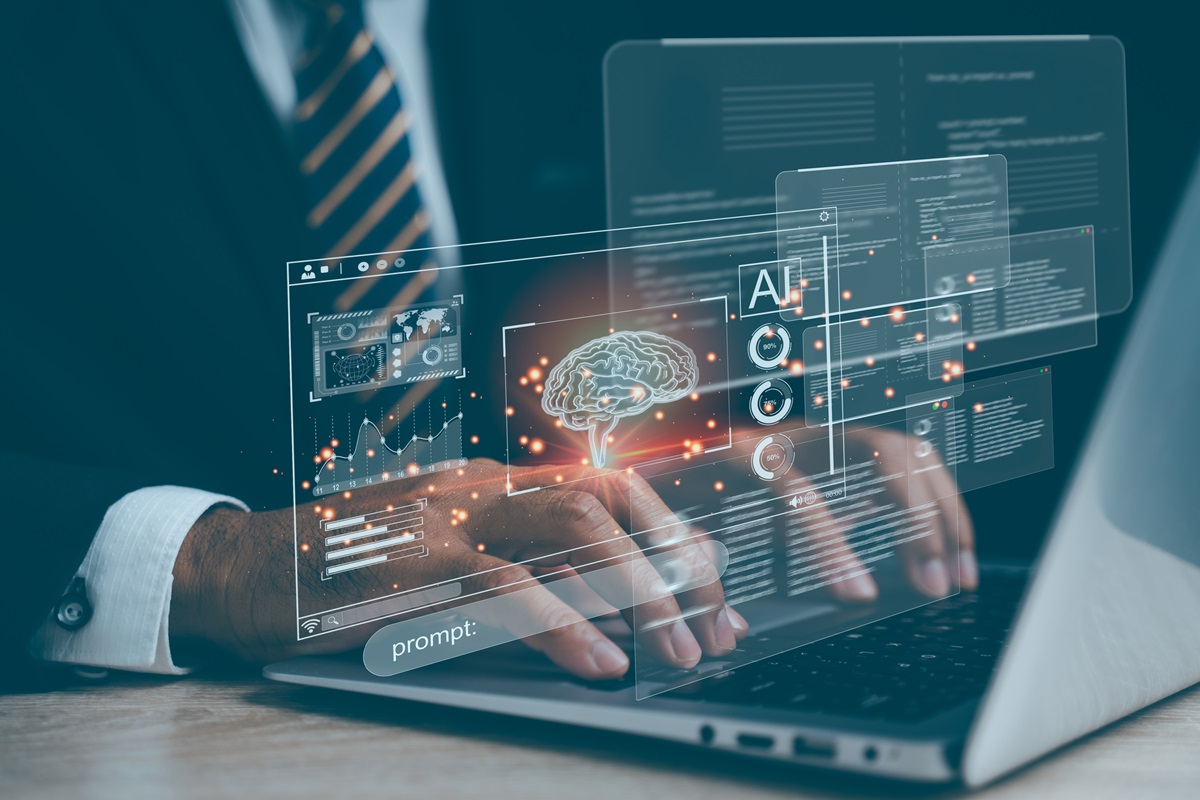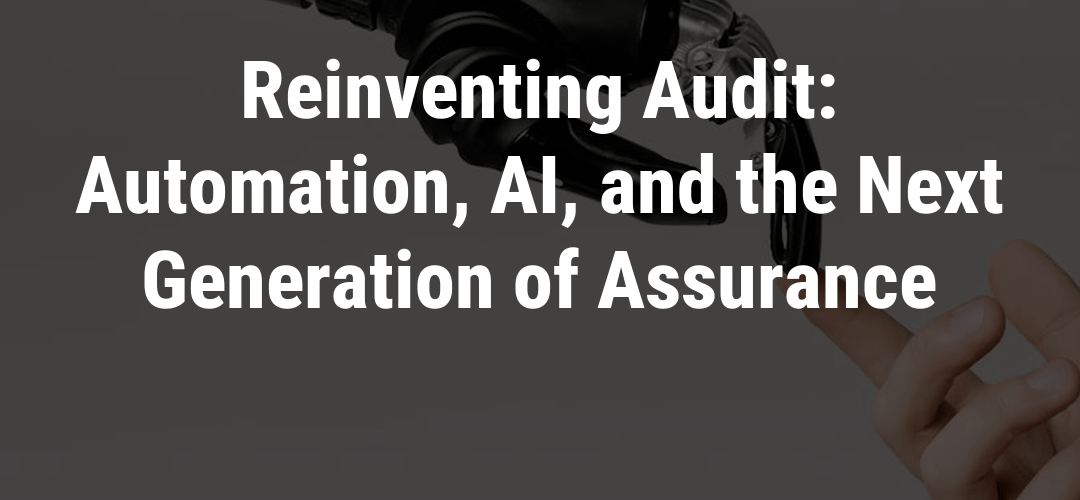by Aprio | October 30, 2025
This article was originally published by Aprio on October 24, 2025.
Summary: Automation, APIs, and AI are transforming audits, enabling 100% testing, faster cycles, and smarter assurance. Discover how these advances are redefining the auditor’s role and the future of compliance.
Imagine this: It’s late on Thursday, and an audit team is still chasing down screenshots, spreadsheets, and emails. The process is slow, repetitive, and let’s be honest, a little frustrating for everyone involved. If you’ve ever been part of an audit, you know the feeling: endless requests, constant back-and-forth, and the pressure to get it right. For decades, this has been the norm. But what if there was a better way? What if audits could be faster, more accurate, and less burdensome for both auditors and clients? Thanks to automation, AI, and API-driven evidence collection, that future is already here.
In this blog, related to our upcoming webinar “Reinventing Audit: Automation, AI, and the Next Generation of Assurance,” we’ll explore:
- How GRC/compliance automation platforms are evolving.
- The role of APIs in pulling audit artifacts directly from systems like HRMS, GitHub, Jira, AWS, and Azure.
- How audit platforms like FieldGuide are leveraging Agentic AI to automate testing.
- The benefits of moving from sampling to 100% testing of control instances.
- How the role of auditors is shifting in this new model.
Why the Audit Profession Needs Reinvention
The reality is the traditional audit process hasn’t kept pace with the demands of today’s digital business environment. Manual evidence collection, sample-based testing, and lengthy back-and-forth have long been accepted to ensure compliance and trust, but it’s no longer enough. As organizations grow more complex and expectations for speed and accuracy rise, the limitations of these legacy methods become impossible to ignore. The profession is now at a crossroads, driven by a growing appetite for smarter, more efficient solutions for our digital economy.
The rise of audit automation, AI in auditing, and API-driven evidence collection, are enabling faster, more comprehensive, and more accurate, than ever before.
The Problem with Traditional Audits
Manual Evidence Collection
We understand how disruptive endless evidence requests can be for your daily operations. Today, auditors and clients spend countless hours requesting documents, screenshots, and logs. This back-and-forth only slows down the process and creates unnecessary frustration for everyone involved.
Sampling-Based Testing
Traditionally, auditors have relied on sampling because manually testing every transaction or control within an organization is simply not feasible. This means that, instead of reviewing the entire population of transactions, auditors select a representative subset to examine in detail. While this approach is grounded in sound statistical principles and has long been accepted as industry best practice, it comes with inherent limitations.
Sampling provides what’s known as “reasonable assurance”, that is, enough confidence to support an audit opinion, but not absolute certainty. In practice, this means that some errors or control failures may go undetected simply because they fall outside the sample. For clients, this can translate into lingering questions about whether the audit truly captured the full picture, especially in complex or high-risk environments. As organizations grow and their operations become more digital and dispersed, the risk of missing critical exceptions increases.

Growing Complexity
Modern organizations operate across cloud platforms, digital systems, and remote teams. Legacy audit methods struggle to keep pace with this complexity, leaving gaps in assurance. Stakeholders, whether boards, regulators, or clients, are demanding greater transparency and assurance that all relevant activities have been evaluated, not just a fraction. This is where the limitations of sampling become most apparent, and why the profession is moving toward more comprehensive, technology-enabled approaches.
GRC/Compliance Automation Platforms: A New Foundation
From Static to Dynamic Platforms
Governance, Risk, and Compliance (GRC) platforms like Fieldguide are transforming the industry by leveraging Agentic AI to automate processes. Once limited to manual uploads and risk registers, they now automatically connect with core business systems to collect audit evidence and deliver smarter assurance. This also includes cross mapping of compliance frameworks which allows for better leverage of evidence across various audit requirements. The result is a reduction in the level of effort required to keep up with ever increasing industry expectations for compliance standards.
API-Driven Evidence Collection
APIs (Application Programming Interfaces) make this possible by securely extracting data directly from systems of record. GRC platforms are developing APIs for almost every data source system imaginable. Some examples include:
- HRMS (Workday, BambooHR, etc.) tracks employee access and onboarding/offboarding.
- GitHub & GitLab ensures code changes follow proper approvals.
- Jira validates that tickets for change management are properly closed.
- AWS & Azure confirm cloud configurations and access controls.
Why This Matters for Audit
Evidence collected via APIs is:
- More reliable because it is pulled directly from the system of record.
- Timelier, updating continuously instead of at a single point in time.
- Less burdensome because clients don’t have to manually compile and send evidence.
This shift sets the stage for a more efficient and accurate audit process, assuming that there are mechanisms in place for auditors to gain comfort that the APIs are correctly configured and pulling accurate and complete information from the correct sources.
Audit Platforms and Agentic AI: The FieldGuide Example
FieldGuide is building on these integrations to revolutionize the auditor’s workflow.
Seamless API Integration
FieldGuide connects directly to compliance automation platforms, importing evidence into engagement files without manual uploads. This creates a streamlined process where auditors can instantly access mapped control data.
Introducing Agentic AI
What truly sets FieldGuide apart is its use of Agentic AI; AI that doesn’t just analyze but actively performs testing tasks. For example:
- Checking whether GitHub commits align with Jira approvals.
- Validating that automated tests ran before code deployment.
- Flagging exceptions when controls weren’t followed.
The result is an audit engagement file that is not only populated with evidence but also pre-tested by AI, allowing auditors to focus on validation and higher-level analysis.
Benefits of Audit Automation
There are several game-changing benefits of audit automation:
- Moving from Sampling to 100% Testing
With automation, every control instance can be tested, eliminating reliance on small samples. This delivers full visibility and allows reporting by exception rather than based on a sample.
- Greater Confidence in Audit Results
Clients, boards, and regulators gain assurance that all control activities have been evaluated—not just a fraction of transactions. Transparency increases when evidence can be traced directly to system data.
- Reduced Burden for Clients and Auditors
Automation reduces the manual workload of gathering, sending, and testing evidence. Clients can focus on operations, while auditors focus on insights and advisory.
- Faster Audit Cycles
With evidence collection and testing largely automated, audit timelines shrink dramatically. Reports can be issued faster, providing timely insights into decision-making.
How the Auditor’s Role Will Change
Perhaps the most important aspect of automation and AI in audits is that this technology doesn’t replace auditors, it elevates them. Rather than removing the need for human expertise, these tools are reshaping the role of the auditor into something more strategic and impactful. With automation handling repetitive tasks like evidence collection and control testing, auditors are free to focus on what truly matters: exercising professional judgment, interpreting results, and advising clients on risk.
In this new model, auditors aren’t just checking boxes; they’re validating that API connections are accurate, ensuring AI logic is functioning as intended, and providing insights that technology alone can’t deliver. Their role becomes more analytical, more consultative, and ultimately more valuable.
This shift is redefining what it means to be an auditor. It’s not about doing less, it’s about doing more of the work that matters.
From Manual Testing to AI Validation
Auditors will shift from performing manual sampling to validating that:
- API connections are accurate.
- Controls in GRC platforms are properly mapped.
- AI testing logic is functioning correctly.
New Skills for Modern Auditors
To succeed in this new model, auditors will need to:
- Understand the modern technology stack and AI
- Understand system integrations and APIs.
- Evaluate AI outputs for accuracy and fairness.
- Interpret exception-based reporting at scale.
- Provide strategic insights into risk management.
This evolution frees auditors from repetitive work, enabling them to deliver greater value and provide strategic insight to clients.
The Future of Assurance: Faster, Smarter, More Accurate
As we look ahead, the benefits of AI-powered audit automation are undeniable:
- Efficiency gains – audits completed in days, not weeks.
- Improved accuracy – direct system evidence and full population testing.
- Enhanced trust – stakeholders gain confidence in financial reporting and compliance.
Audit is no longer just a compliance exercise; it’s becoming a real time assurance function that provides actionable insights.
Final Thoughts: Reinventing Audit for the Next Generation
The audit profession is being redefined by compliance automation, API-driven evidence collection, and Agentic AI. These technologies are eliminating inefficiencies, improving accuracy, and empowering auditors to focus on higher-value activities.
But one thing hasn’t changed: the need for professional judgment, skepticism, and oversight. Technology may automate the mechanics, but auditors remain the stewards of trust.
Please connect with your advisor if you have any questions about this article.
Embark on a journey to financial well-being!
Contact Verity CPAs today for a personalized consultation!
This article was written by Aprio and originally appeared on 2025-10-24. Reprinted with permission from Aprio LLP. © 2025 Aprio LLP. All rights reserved. https://www.aprio.com/reinventing-audit-automation-ai-and-the-next-generation-of-assurance-ins-article-ia/
“Aprio” is the brand name under which Aprio, LLP, and Aprio Advisory Group, LLC (and its subsidiaries), provide professional services. LLP and Advisory (and its subsidiaries) practice as an alternative practice structure in accordance with the AICPA Code of Professional Conduct and applicable law, regulations, and professional standards. LLP is a licensed independent CPA firm that provides attest services, and Advisory and its subsidiaries provide tax and business consulting services. Advisory and its subsidiaries are not licensed CPA firms.
This publication does not, and is not intended to, provide audit, tax, accounting, financial, investment, or legal advice. Readers should consult a qualified professional advisor before taking any action based on the information herein.

